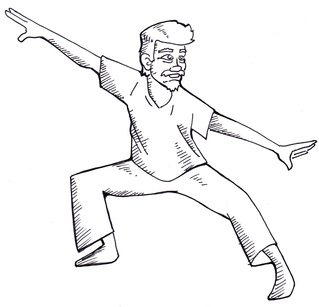
We’ve started a fresh year—yay! The world, of course, is in turmoil, AND is simply glorious: divinely organized and effervescing with cooperation, courage and compassion. (You doubt? I could give you a thousand examples! Look at the symmetry of a leaf, the organized and complex functions within your own cellular structure, the rhythm of the tides, the precise flying formation of geese…it goes on and on. But don't look for that in the news.)
Since we are a wee part of this much greater whole, our care of our own selves contributes to the health of the planet and all involved—much as each of your well-functioning cells contributes to the wellness of your entire being. So how about a New Year’s inventory of emotional wellness? (Just imagine living in an emotionally HEALTHY world. Wow! Oh, the beauty…).
What does emotional wellness look like to you? Would it allow you to flow with your emotions, even when you don’t like them? Would you be confidant that you can work with whatever arises within you? Would you feel nourished by enjoyable emotions and learn valuable lessons from the harsh and painful ones? What if it meant accepting all your feelings, as in Rumi’s poem, The Guesthouse? (see below.)
Emotions and feelings are information. They are the very stuff of life, supplying richness and texture to our moments. However, emotional reactions are not necessarily “cues” to take immediate action. If they were, you would not hesitate to, say, lop the head off your ex or run screaming out of your car in a busy intersection (though I’m surprised this doesn’t happen more often). Our beautiful frontal lobes—the abundant rumpled terrain of the more recently developed part of the brain that is wrapped over and around the reactive mid-brain and the instinctual reptilian brain—is in exquisite use when it gallops after a rush of emotion (bodily felt) to interpret and assess. But bringing the frontal lobes into the picture requires a momentary pause, because they trail after triggered emotions.
Pause to figure out how you want to handle your emotional reactivity. You might take the ‘macro’ view and realize: “I don’t want my behavior to be dictated by someone else’s dopiness! I’ve got a choice here—and I’m walking away.” This kind of reaction, which is appropriate more often than we think, allows us to flow around obstacles and over bumpy terrain. It eases us out of anxiety provoking situations so we don’t fester over them and fuel emotional insecurity. Let it go and let it flow. It’s a relief to realize that in our frontal lobes, we have assistance. But the saga is that rarely are we taught HOW to use this skill—how to work with engulfing emotion. And that’s a blog for another day.
Since we are a wee part of this much greater whole, our care of our own selves contributes to the health of the planet and all involved—much as each of your well-functioning cells contributes to the wellness of your entire being. So how about a New Year’s inventory of emotional wellness? (Just imagine living in an emotionally HEALTHY world. Wow! Oh, the beauty…).
What does emotional wellness look like to you? Would it allow you to flow with your emotions, even when you don’t like them? Would you be confidant that you can work with whatever arises within you? Would you feel nourished by enjoyable emotions and learn valuable lessons from the harsh and painful ones? What if it meant accepting all your feelings, as in Rumi’s poem, The Guesthouse? (see below.)
Emotions and feelings are information. They are the very stuff of life, supplying richness and texture to our moments. However, emotional reactions are not necessarily “cues” to take immediate action. If they were, you would not hesitate to, say, lop the head off your ex or run screaming out of your car in a busy intersection (though I’m surprised this doesn’t happen more often). Our beautiful frontal lobes—the abundant rumpled terrain of the more recently developed part of the brain that is wrapped over and around the reactive mid-brain and the instinctual reptilian brain—is in exquisite use when it gallops after a rush of emotion (bodily felt) to interpret and assess. But bringing the frontal lobes into the picture requires a momentary pause, because they trail after triggered emotions.
Pause to figure out how you want to handle your emotional reactivity. You might take the ‘macro’ view and realize: “I don’t want my behavior to be dictated by someone else’s dopiness! I’ve got a choice here—and I’m walking away.” This kind of reaction, which is appropriate more often than we think, allows us to flow around obstacles and over bumpy terrain. It eases us out of anxiety provoking situations so we don’t fester over them and fuel emotional insecurity. Let it go and let it flow. It’s a relief to realize that in our frontal lobes, we have assistance. But the saga is that rarely are we taught HOW to use this skill—how to work with engulfing emotion. And that’s a blog for another day.

Meanwhile, think in terms of emotional tai ch’i—emotional fluidity. Anxiety is so clinchy! The only flowing going on is of icky cortisol related neurochemicals in the bloodstream, which get triggered again and again by the extremism of thoughts. We become stuck in a neurochemical bath that feels horrible and seems dangerous—so it is self-reinforcing and hard to shut down. For example, what about if you think they hate me! What if then a calmer voice spoke up within and asked, Really? That’s a pretty strong emotion. Am I so important to them that I am worthy of their hate? Do they really know me, at all? What if the nasty look I just received was because that person has indigestion? Hah! Good point. So much is really “not about me!” Emotional fluidity opens a path out of the clinch of anxiety (whew).
The Guesthouse
This being human is a guest house
Every morning a new arrival.
A joy, a depression, a meanness,
some momentary awareness comes
as an unexpected visitor.
Welcome and entertain them all!
Even if they are a crowd of sorrows,
who violently sweep your house
empty of its furniture,
still treat each guest honorably.
He may be clearing you out for some new delight.
The dark thought, the shame, the malice,
meet them at the door laughing,
and invite them in.
Be grateful for whoever comes,
because each has been sent
as a guide from beyond.
~Rumi
This being human is a guest house
Every morning a new arrival.
A joy, a depression, a meanness,
some momentary awareness comes
as an unexpected visitor.
Welcome and entertain them all!
Even if they are a crowd of sorrows,
who violently sweep your house
empty of its furniture,
still treat each guest honorably.
He may be clearing you out for some new delight.
The dark thought, the shame, the malice,
meet them at the door laughing,
and invite them in.
Be grateful for whoever comes,
because each has been sent
as a guide from beyond.
~Rumi




